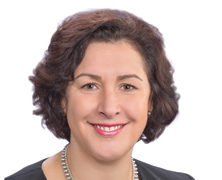Growing up in A Coruña, a medium-size provincial town in Northern Spain, family meant everything. Seven of us shared a small apartment and one bathroom, and every decision was about the collective, never the individual. I had, and still have, lots of personal interests—literature, languages, and the arts—but I had to be pragmatic when choosing an occupation. My parents didn’t have a lot of money to send me to the capital city to study, so I went to the local school on a scholarship. I’ve always been good with chemistry and mathematics, so that’s what I studied.
Looking back, I realize there’s never been a non-working woman in my family. My mom worked in a factory. My grandmother washed clothes for others in the river, and my great-grandmother was a factory worker as well. They are my inspiration. I keep a picture of my grandmother holding my hand as a child in my office. When I become frustrated at work, I look at her and I am immediately reminded that I am privileged to have a stimulating, interesting job.
All of my successes have come about because I have been able to form relationships. Good, strong working relationships lead to great results. As a leader, I focus on understanding the unique value of each individual. I try to see what is good in each person and help change that quality to excellent.
I am constantly learning to overcome professional obstacles, the biggest of which is my own tendency to speak as I think. I know this is often suboptimal, so I focus on developing my filter and rely on trusted colleagues to remind me to listen more. Humility is important to me, and I realize I’m only as good as my team is. I believe that being able to recognize personal mistakes is an asset.
Anywhere in life, all you can do is your best. Remaining flexible allows you to be ready to react when unexpected opportunities come your way. Recognizing an opportunity and then doing your best will guarantee your results. I believe that life is not a destination and that how you achieve your goals is more important than what you think those goals are at any given point. Goals may change, your principles should not. You cannot control your environment, but you can control your attitude and effort.
How has education affected your career?
Education is a condition that is necessary but not sufficient for establishing a career. Education is a starting point, but you need to remain a lifelong learner if you want your career to thrive.
What does it take to succeed and stay competitive in your position/field?
You need flexibility and curiosity. You also need to be adaptable and have learning agility. I also believe that being humble is critical in order to remain a learner and accept change.
Has discrimination affected you as a woman in the workplace? How did you deal with it?
I have been very lucky to never encounter discrimination. I may have been underestimated at times, but that is not a barrier encountered exclusively by women. In fact, I probably would have to blame myself if I have ever been underestimated.







